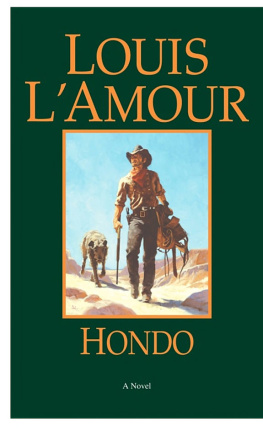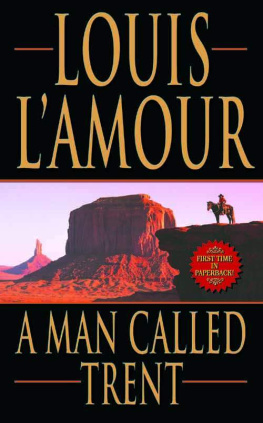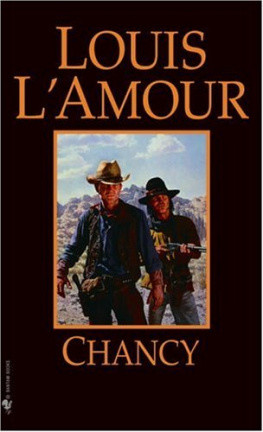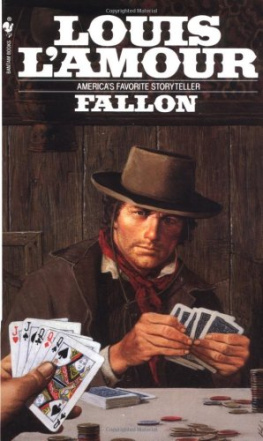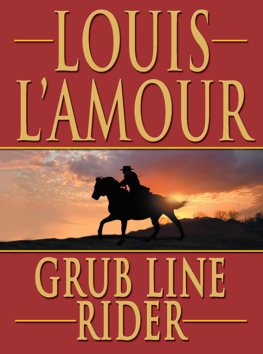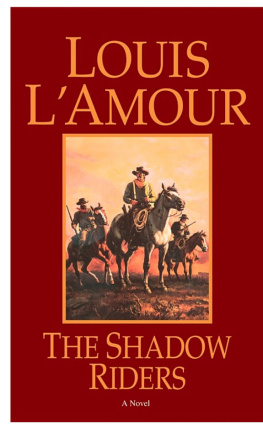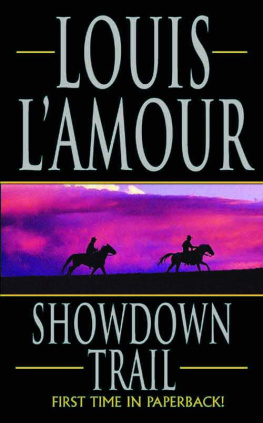Louis LAmour - Kiowa Trail
Here you can read online Louis LAmour - Kiowa Trail full text of the book (entire story) in english for free. Download pdf and epub, get meaning, cover and reviews about this ebook. year: 2004, publisher: Bantam, genre: Adventure. Description of the work, (preface) as well as reviews are available. Best literature library LitArk.com created for fans of good reading and offers a wide selection of genres:
Romance novel
Science fiction
Adventure
Detective
Science
History
Home and family
Prose
Art
Politics
Computer
Non-fiction
Religion
Business
Children
Humor
Choose a favorite category and find really read worthwhile books. Enjoy immersion in the world of imagination, feel the emotions of the characters or learn something new for yourself, make an fascinating discovery.

- Book:Kiowa Trail
- Author:
- Publisher:Bantam
- Genre:
- Year:2004
- Rating:3 / 5
- Favourites:Add to favourites
- Your mark:
- 60
- 1
- 2
- 3
- 4
- 5
Kiowa Trail: summary, description and annotation
We offer to read an annotation, description, summary or preface (depends on what the author of the book "Kiowa Trail" wrote himself). If you haven't found the necessary information about the book — write in the comments, we will try to find it.
Kiowa Trail — read online for free the complete book (whole text) full work
Below is the text of the book, divided by pages. System saving the place of the last page read, allows you to conveniently read the book "Kiowa Trail" online for free, without having to search again every time where you left off. Put a bookmark, and you can go to the page where you finished reading at any time.
Font size:
Interval:
Bookmark:
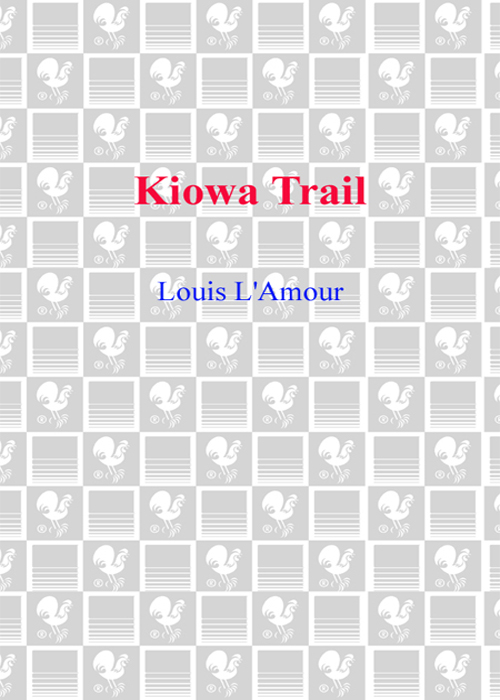
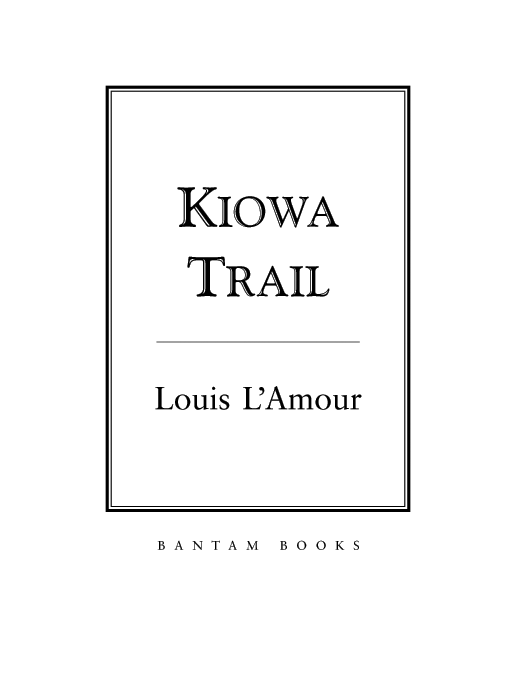
Contents
A T OWN C ALLED D EATH
G O BACK TO town, she said. Tell them the truth, that we would not allow you into our camp. Then sell your saloon.
Sell my saloon? he repeated in astonishment. Why, I cant do that!
Would you rather sell at a lossand you may have toor come out with nothing at all?
What do you mean by that?
Mr. Bannion, Kate asked quietly, did you ever see a town die?
He just looked at her, and after a minute he said, Thank you, maam. Thank you. Then he turned his horse.
Well, I looked at her. What she had in her mind I did not know, but looking at her faceand never had I seen it so coldI knew what was going to happen to the town.
That town, the town that had killed her brother, was going to die.
It was not a man, nor several men who were going to die, but the town itself.
To Lieut. Ambrose Freeman,
my great-grandfather, who lost his scalp
to the Sioux, Dakota Territory, 1863.
We rode a Kiowa Trail, him and me,
with Winchesters to point the way.
from the diary of Jordan Rascoe.
Chapter 1
W E CAME UP the trail from Texas in the spring of 74, and bedded our herd on the short grass beyond the railroad. We cleaned our guns and washed our necks and dusted our hats for town, riding fifteen strong to the hitching rail and standing fifteen strong to the bar.
We were the Tumbling B from the rough country of the Big Bend, up the trail with three thousand head of longhorn steers, the first that spring, although the rivers ran bank-full and Comanches rode the war trail.
We had buried two hands south of the Red and one on the plains of the Nation. A fourth had died on Kansas grass, his flesh churned under a thousand tearing hoofs. Two men had fallen before Comanche rifles, but the Comanches sang their death songs in the light of a hollow moon, and the Kiowas mourned in their lodges for warriors who fell before the guns of the Tumbling B.
The town to which we had come was ten buildings long on the north side of the street, and seven long on the south, with stock corrals to the east, and a Boot Hill on the west, and in between an edging from the mills of hell.
South of the street were the shacks of the girls, and north of it the homes of the respectable businessmen of the town, where no trail driver was permitted to go.
We were the riders who drove the beef on which the towns existence was built, fighting dust, hail, and lightning, meeting stampede and Kiowa lance, leaving the Comanche dead in his own tall grass. We fought our nameless Alamos and rode to our deaths without a song of glory, nor any memory to leave behind except a hand less at the night guard and an empty saddle in the chuck wagon.
We rode the long grass miles where no boundaries were, some riding a days work for a days pay, but others filled with their own wild poetry, conscious of the epic they rode.
Wild and hard were the men of the Tumbling B. Only two of us were past thirty, and some not yet twenty. We meant money to the girls of the Line and whiskey sales to the bartenders; to the merchants we were lean, brown young savages whose brief assault on their town was tolerated because of the money we brought.
That was the year I was thirty-five, and only the cook was as old as I. It was my fifth trip up the trail. Id seen this town born from the stock pens, and other towns before it. At least one of those towns Id seen die, leaving only brief scars for the prairie grass to erase.
We rode up the trail as before, with Kate Lundy driving her army ambulance alongside the chuck wagon, and when the Kiowas attacked, Kates buffalo gun boomed an echo to our own.
That was the year when young Tom Lundy was nineteen, as much of a man as any man could wish to be, and he had left no love back in Texas.
He was one among us who rode north with a dream. For he wanted a girl, not just one to hold in his arms for a passing hour, but one to whom he could speak in the moonlight, a girl eager for the bright beauty of new love, with ears to listen to the words born of the poetry of life that had awakened within him.
And I, who had ridden beside him and seen him grow from the boy hed been to the man he had become, knew what lay within him, knew the better because my heart had been singing its own song, and my horses hoofs had drummed a tune to the sound of the same haunting, far-off bells.
The girl stood on the boardwalk outside the store, and when she lifted a hand to shade her eyes toward us, the sun caught at the red lights in her hair, and her eyes reached out for Tom as he rode up the street.
She looked straight at him, with a smile on her face, and at nineteen the smile of a strange girl is a glory to the blood and a spark to the spirit, carrying a richer wine than any sold across the bar of a frontier saloon.
Hed had no shave for days, and the dust of the trail lay thick on his clothing, but he stepped down from the saddle and walked toward her. She looked at him, a long, appraising look, and then she turned and went inside. The glance she left with him neither promised nor rejected.
He had taken his hat off, and now his hair blew in the wind. He stood there staring, his heart yearning after her. Up the street John Blake was watching, the black cigar in his teeth, and then his eyes turned to me. He rolled his cigar to the other side of his mouth, then turned away and walked up the street.
Tom came back to his horse. Conn, he said excitedly, did you see her? Did you see that girl?
I saw her.
He wanted a bath and a shave, he wanted new clothesand he wanted to know that girl.
Its trouble youre facing, Tom Lundy, I said. She was a bonny lass, but you know the rules. No trail hand may walk north of the street, nor disturb the citizens.
Ive got to know her, Conn. Ive got to! Im not going to bother anybody. Its just that Ive got to know her, to talk to her.
This is John Blakes town.
The name had a special sound of its own, for it was a name known wherever cattle grazed. He was a hard man, trained by experience in the handling of hard men, knowing as much of their ways and movements as we knew of the cattle we drove. When he spoke, his voice was law. A square, powerful man with square, powerful hands, a man with a reputation for square dealing, but one who backed his law with a gun.
This is a time for courting, Tom Lundy said, and I want trouble with no manleast of all with John Blake.
When we stepped down from our saddles at the Bon Ton, I heard Red Mike say, No drinking this day. Weve got a man to stand behind.
There was a bright eagerness in young Toms eyes, and I stood there on the walk, watching him, and thinking about it.
Tom Lundy was a manman-strong, and man in the work he did. He was Kate Lundys brother, but he had asked no favors because of it, standing to his work through drouth and blizzard, through dust and Indian battle. Yet in some ways he was very young, for in our wild country there were no girls for miles, and none for the likes of young Tom, who had grown to manhood on the novels of Sir Walter Scott.
In his own dreams he was a knight in bright armor who rode to find the golden-haired princess. He was no fool, no wild-eyed idealist, but simply a strong young man with an honest dream, a dream that his sisterand I, God help mehad helped to build.
And he had seen the girl.
It might have been any of a thousand girls in a thousand towns spread across the land, but the moment was here, and it was this one he had seen.
Next pageFont size:
Interval:
Bookmark:
Similar books «Kiowa Trail»
Look at similar books to Kiowa Trail. We have selected literature similar in name and meaning in the hope of providing readers with more options to find new, interesting, not yet read works.
Discussion, reviews of the book Kiowa Trail and just readers' own opinions. Leave your comments, write what you think about the work, its meaning or the main characters. Specify what exactly you liked and what you didn't like, and why you think so.

